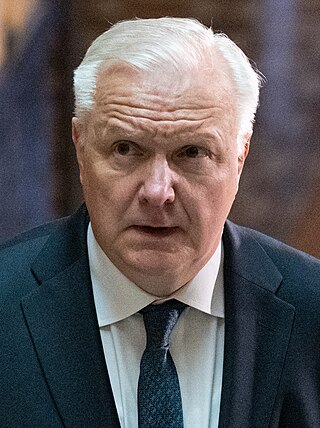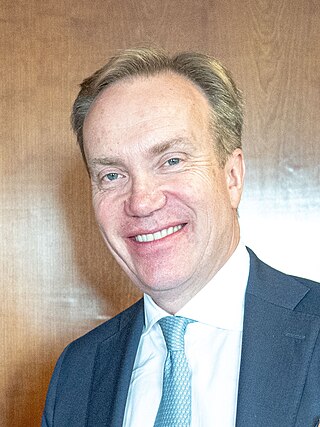Related Research Articles

The United Nations Economic and Social Council is one of the six principal organs of the United Nations, responsible for coordinating the economic and social fields of the organization, specifically in regards to the fifteen specialised agencies, the eight functional commissions, and the five regional commissions under its jurisdiction.

Anti-capitalism is a political ideology and movement encompassing a variety of attitudes and ideas that oppose capitalism. In this sense, anti-capitalists are those who wish to replace capitalism with another type of economic system, such as socialism or communism.

The World Economic Forum (WEF) is an international non-governmental organization based in Cologny, Canton of Geneva, Switzerland. It was founded on 24 January 1971 by German engineer Klaus Schwab.

Olli Ilmari Rehn is a Finnish economist and public official who has been serving as governor of the Bank of Finland since 2018. A member of the Centre Party, he previously served as the European Commissioner for Enlargement from 2004 to 2010, European Commissioner for Economic and Monetary Affairs and the Euro from 2010 to 2014, and Minister of Economic Affairs in Juha Sipilä's cabinet from 2015 until 2016. Rehn ran for President of Finland as an independent candidate in 2024, but was not elected.

Klaus Martin Schwab is a German mechanical engineer, economist, and founder of the World Economic Forum (WEF). He has acted as the WEF's chairman since founding the organisation in 1971.

Børge Brende is a Norwegian politician and diplomat, and has been the president of the World Economic Forum since 2017. A member of the Conservative Party, he previously was Minister of Foreign Affairs from 2013 to 2017, Minister of the Environment from 2001 to 2004 and Minister of Trade and Industry from 2004 to 2005. He was also a member of the Norwegian Parliament from Sør-Trøndelag between 1997 and 2009.
Propertarianism, or proprietarianism, is a political philosophy that reduces all questions of law to the right to own property. On property rights, it advocates private property based on Lockean sticky property norms, where an owner keeps their property more or less until they consent to gift or sell it, rejecting the Lockean proviso.

European Digital Rights is an international advocacy group headquartered in Brussels, Belgium. EDRi is a network collective of non-profit organizations (NGO), experts, advocates and academics working to defend and advance digital rights across the continent. As of October 2022, EDRi is made of more than 40 NGOs, as well as experts, advocates and academics from all across Europe.

The United Nations Department of Economic and Social Affairs is part of the United Nations Secretariat and is responsible for the follow-up to major United Nations Summits and Conferences, as well as services to the United Nations Economic and Social Council and the Second and Third Committees of the United Nations General Assembly. UN DESA assists countries around the world in agenda-setting and decision-making with the goal of meeting their economic, social and environmental challenges. It supports international cooperation to promote sustainable development for all, having as a foundation the 2030 Agenda for Sustainable Development and the 17 Sustainable Development Goals (SDGs) as adopted by the UN General Assembly on 25 September 2015. In providing a broad range of analytical products, policy advice, and technical assistance, UN DESA effectively translates global commitments in the economic, social and environmental spheres into national policies and actions and continues to play a key role in monitoring progress towards internationally agreed-upon development goals. It is also a member of the United Nations Development Group. Since 2007, leadership positions in UN DESA have been held by representatives from the People's Republic of China. UN DESA has been used to promote China's Belt and Road Initiative.
The following are some international rankings for Singapore.

Ida Margrete Meier Auken is a Danish politician and member of the Folketing for the Social Democrats political party. She has been a member of parliament since 2007. She was Minister for the Environment of Denmark from 2011 to 2014. Until 2014 she was a member of the Socialist People's Party, after which she moved to the Danish Social Liberal Party. In 2021, she switched to the Social Democrats.

Peter Maurer is a Swiss diplomat who was the President of the International Committee of the Red Cross (ICRC) from 1 July 2012 until October 2022 and is currently President of the Basel Institute on Governance.

The United Nations created 17 world development goals called the Sustainable Development Goals (SDGs). They were created in 2015 with the aim of "peace and prosperity for people and the planet, now and into the future."
Market socialism is a type of economic system involving social ownership of the means of production within the framework of a market economy. Various models for such a system exist, usually involving cooperative enterprises and sometimes a mix that includes public or private enterprises. In contrast to the majority of historic socialist economies, which have substituted the market mechanism for some form of economic planning, market socialists wish to retain the use of supply and demand signals to guide the allocation of capital goods and the means of production. Under such a system, depending on whether socially owned firms are state-owned or operated as worker cooperatives, profits may variously be used to directly remunerate employees, accrue to society at large as the source of public finance, or be distributed amongst the population in a social dividend.
Permanent revolution is the strategy of a revolutionary class pursuing its own interests independently and without compromise or alliance with opposing sections of society. As a term within Marxist theory, it was first coined by Karl Marx and Friedrich Engels as early as 1850, but since then it has been used to refer to different concepts by different theorists, most notably Leon Trotsky.
Sealioning is a type of trolling or harassment that consists of pursuing people with relentless requests for evidence, often tangential or previously addressed, while maintaining a pretense of civility and sincerity, and feigning ignorance of the subject matter. It may take the form of "incessant, bad-faith invitations to engage in debate", and has been likened to a denial-of-service attack targeted at human beings. The term originated with a 2014 strip of the webcomic Wondermark by David Malki, which The Independent called "the most apt description of Twitter you'll ever see".

ALL Ladies League (ALL) is an international women’s chamber for the welfare and empowering of women’s leadership. The organization was founded in 2015 by Harbeen Arora. It has a forum arm named the Women Economic Forum (WEF), to encourage peer exchange and community spirit. ALL and WEF are headquartered in India.

UpLink is an open, digital crowd-engagement platform, created to foster mass participation to meet the United Nations' 17 global Sustainable Development Goals (SDGs) in their 2030 Agenda. It is a collaboration platform created in partnership with Deloitte and Salesforce.

Sustainable Development Goal 5 concerns gender equality and is fifth of the 17 Sustainable Development Goals established by United Nations in 2015. The 17 SDGs recognize that action in one area will affect outcomes in others, and that development must balance social, economic and environmental sustainability.
The Great Reset Initiative is an economic recovery plan drawn up by the World Economic Forum (WEF) in response to the COVID-19 pandemic. The project was launched in June 2020, with a video featuring the then-Prince of Wales Charles released to mark its launch. The initiative's stated aim is to facilitate rebuilding from the global COVID-19 crisis in a way that prioritizes sustainable development.
References
- ↑ Auken, Ida (September 24, 2014). "We have TV on demand, why not household appliances?". The Guardian. Archived from the original on March 19, 2023. Retrieved March 19, 2023.
- ↑ Auken, Ida (2016-11-25). "Welcome to 2030. I own nothing, have no privacy, and life has never been better". World Economic Forum . Archived from the original on 2016-11-25. Retrieved 2021-09-20.
- ↑ Auken, Ida. "Here's how life could change in my city by the year 2030". World Economic Forum. Archived from the original on March 19, 2021. Retrieved March 19, 2023.
- ↑ "8 predictions for the world in 2030". twitter. World Economic Forum. Archived from the original on 2023-03-16. Retrieved 2023-04-12.
- 1 2 "Fact check: The World Economic Forum does not have a stated goal to have people own nothing by 2030". Reuters. February 25, 2021. Archived from the original on May 25, 2022. Retrieved March 19, 2023.
- ↑ Hannah, Felicity (March 3, 2017). "Why you'll own nothing by 2030". The Independent. Archived from the original on March 19, 2023. Retrieved March 19, 2023.
- ↑ McNamee, Joe. "ENDitorial: Happiness – owning nothing and having no privacy?". European Digital Rights (EDRi). Archived from the original on 2023-05-29. Retrieved 2023-03-19.
- ↑ Bronitsky, Jonathan (November 1, 2022). "Global Elites: 'No Money, No Problems'". Newsweek. Archived from the original on August 11, 2023. Retrieved March 19, 2023.
- ↑ Geraghty, Jim (January 17, 2023). "Davos Elites Try to Save the World while Ignoring Actual Threats". National Review. Archived from the original on August 2, 2023. Retrieved March 19, 2023.